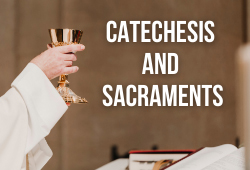What to expect
Parent’s role in Religious EducationThe parent first makes the formal decision to pass on faith when the child is brought to be baptized. The rite of baptism acknowledges that children first experience God in the arms of their parents. The home is where children first experience the sacred presence of God as personal and intimate or come to believe in an impersonal and indifferent God because of the behavior modeled by parents. By watching and imitating parents, children learn how to love and embrace, to listen and respond, to belong, to forgive, to pray, to reach out and to serve, or conversely, will not learn these virtues and behaviors if they are not modeled by the parents. These common parental activities form the core of the ministry that make parents the primary educators in faith.
When should my child start Religious Education?
Parish programs are designed to help you in this most important task. Parishes are expected to have pre-school programs when possible to do so. Many have a “Liturgy of the Word for Children” program which will take children out of the Sunday Mass to hear the readings in a language more appropriate to their understanding.
Children should be enrolled in the religious education program at least by first grade since many parishes have a two year enrollment requirement for the reception of First Penance in the second grade. Parishes will usually have formation programs for children and youth through Confirmation and beyond.
Terms you might hear/see used
"Catechism": Many older people refer to the classes used to form young people in the faith as catechism classes. This term came into use because the typical textbook studied in these classes was the Baltimore Catechism. This term is no longer used by parishes since parishes now use a series of modern texts.
"CCD": This term refers to a very specific program officially known as the “Confraternity of Christian Doctrine.” This program was a very comprehensive process that specified not only class content but teacher training and recruitment as well. Many people still refer to the parish program as CCD even though there are no parishes actually still using the “Confraternity” method.
Religious Education Program: This is the generally preferred term in most parishes today when describing the formation program for children and youth. This is the name you will see most often advertised in the parish bulletin. This name came into use in the 1970’s because it best describes what the parish program is attempting to accomplish: an education in the art of living a religious life.
"Faith Formation Program": There are a few parishes that prefer to call their program for children and youth the “Faith Formation Program.” The term is pretty clear in its intention to help people come to a living faith.
Whole Community Catechesis: This is a term that is coming more and more into use in the last several years. The essential difference that this term is trying to capture is that formation in faith is for the whole community (adults included) and not just children. Your parish may sponsor an event in which the entire community is invited to come and learn something about the faith (each at their appropriate level) so that they entire community is learning together.
Email us and we will do our best to get you an answer as soon as possible.

